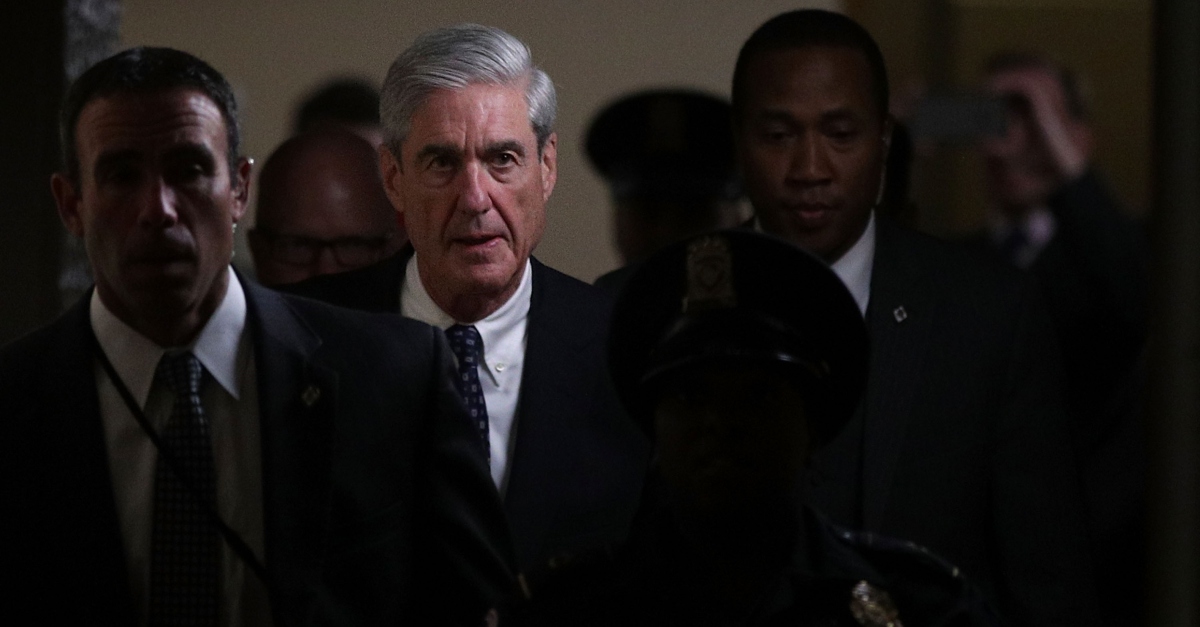
A second fireworks display went off in the D.C. Circuit Court of Appeals on Friday morning as House Democrats pressed for additional key information relevant to the ongoing impeachment process after an earlier hearing in which the Department of Justice (DOJ) claimed that Congress can never successfully sue the executive branch in federal court.
That second panel hearing–held before Judges Thomas B. Griffith, Judith Rogers and Neomi Rao–was focused on whether the appeals court should okay the release of secret grand jury materials used by former special counsel Robert Mueller to compile his report for Congress. A lower court in D.C. has already demanded their release.
At one point in the hearing, Griffith elicited some news from U.S. House of Representatives General Counsel Douglas Letter.
“Are you saying there may be a third article of impeachment?” the judge asked.
“Yes, that’s on the table,” Letter revealed, “there is no doubt.”
Griffith and Letter earlier sparred on some of the underlying issues.
“It seems to me, Mr. Letter, that the force of your argument is: when the House comes in and invokes the word ‘impeachment’ that it’s a mantra,” Griffith prodded. ‘”Impeachment, therefore the House gets everything.’ Does the law say that?”
Letter disputed the judge’s broad-based interpretation of the Democrats’ argument.
“No, that’s not what we’re saying,” the House’s lead counsel said–noting that the original decision demanding the disclosure by U.S. District Judge Beryl A. Howell did not grant the House the entirety of Mueller’s grand jury materials.
“Judge Howell ordered a very discrete type of disclosure,” Letter continued. “So, first of all, we’re only talking about the Mueller Report–so, we’re not talking about all the Mueller grand jury information…it’s limited because it’s what special counsel Mueller decided to put into his report. And, all that Judge Howell gave us were the redactions and the underlying transcripts about those redactions.”
Letter also noted that the lower court proposed a potential disclosure schedule where the requested information would be released in stages.
“We can go back to her, she said,” the House counsel noted.
Griffith also said he struggled to understand how a federal judge could shepherd the parties through the process without reading the entirety of the grand jury materials. The issue, essentially, was picked up by Griffith due to the Department of Justice (DOJ) somewhat disingenuously arguing over the definition of the legal term of art, “particularized need.”
Earlier, Justice Department Civil Division Appellate Staff Director Mark Freeman disagreed with Judge Howell’s prior finding–expressed across a six-page analysis–that the particularized need in the grand jury materials case is “for a full and fair impeachment proceeding.”
“I think the district court should have gone on a redaction-by-redaction basis,” Freeman told Judge Griffith, “Or at minimum on a grouped-redaction basis.”
Letter rubbished Freeman’s entire line of thought as implausible and essentially a dishonest attempt to mislead the court:
“Mr. Freeman is wrongly understanding what particularized need means. Particularized need doesn’t mean ‘We have to show that, at page 14 of the grand jury transcript, line seven, I want that line so that I can impeach, at trial, witness Lois Lane‘ The Supreme Court has made clear, no, that’s not what particularized need means.”
“What do you think it means?” Griffith attempted to clarify.
“Particularized need is a balancing. So, one, we look at the needs for grand jury secrecy,” Letter went on. “It’s done. So they have almost no reason for grand jury secrecy.”
Letter then elaborated on his argument:
These aren’t going to be used against witnesses who were witnesses before the grand jury and then are at trial. That’s extremely unlikely to happen before the Senate. So, it’s not that kind of interest. So, there’s almost no–nothing left on the balance of grand jury secrecy. Again, the Supreme Court decisions make that absolutely clear. Mr. Freeman cannot deny that. He cannot stand up here and deny that.
“Second then, is, what is the interest–how is that to be balanced with the interest of justice?” Letter asked before answering his own question. “This is the most–this is it. There’s nothing more important than determining whether the president of the United States should remain the president of the United States.”
Judge Rao was decidedly more combative with Letter–repeatedly asserting that a court has never actually had to intervene in the past over such a protracted dispute between the two political branches of government.
Rao asked a “hypothetical” question about enforcing the Mueller grand jury materials subpoena if Attorney General Bill Barr‘s DOJ simply declined to turn them over–even after the courts had held in the Democrats’ favor. Letter responded that the question–and presumably the answer–was “a little awkward” but admitted that the House could either rely on the courts or send over its sergeant-at-arms and ask for those materials.
“So, you do have some methods of self-help that don’t require this court to intervene?” Rao asked.
“Absolutely, we could send the sergeant-at-arms and he could go have a gun battle.”
“So, why not avail yourself of that remedy?” Rao asked.
“The reason is obvious,” a somewhat stupefied Letter replied.
“Why is it obvious?” Rao pressed.
“That’s why we don’t do that anymore,” Letter pushed forward, “We don’t have the sergeant-at-arms go out and arrest people and maybe have a gun with Mr. Barr’s FBI security detail. Instead, we go to court. Everybody has recognized that. We go to court.”
[image via Alex Wong/Getty Images]
Have a tip we should know? [email protected]